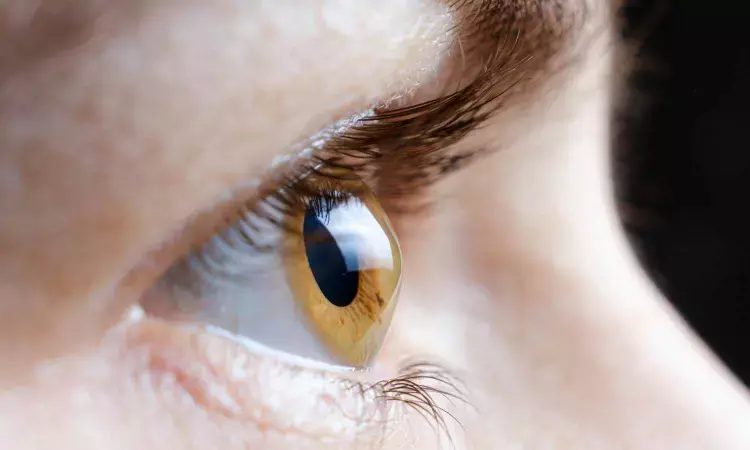- Home
- Medical news & Guidelines
- Anesthesiology
- Cardiology and CTVS
- Critical Care
- Dentistry
- Dermatology
- Diabetes and Endocrinology
- ENT
- Gastroenterology
- Medicine
- Nephrology
- Neurology
- Obstretics-Gynaecology
- Oncology
- Ophthalmology
- Orthopaedics
- Pediatrics-Neonatology
- Psychiatry
- Pulmonology
- Radiology
- Surgery
- Urology
- Laboratory Medicine
- Diet
- Nursing
- Paramedical
- Physiotherapy
- Health news
- Fact Check
- Bone Health Fact Check
- Brain Health Fact Check
- Cancer Related Fact Check
- Child Care Fact Check
- Dental and oral health fact check
- Diabetes and metabolic health fact check
- Diet and Nutrition Fact Check
- Eye and ENT Care Fact Check
- Fitness fact check
- Gut health fact check
- Heart health fact check
- Kidney health fact check
- Medical education fact check
- Men's health fact check
- Respiratory fact check
- Skin and hair care fact check
- Vaccine and Immunization fact check
- Women's health fact check
- AYUSH
- State News
- Andaman and Nicobar Islands
- Andhra Pradesh
- Arunachal Pradesh
- Assam
- Bihar
- Chandigarh
- Chattisgarh
- Dadra and Nagar Haveli
- Daman and Diu
- Delhi
- Goa
- Gujarat
- Haryana
- Himachal Pradesh
- Jammu & Kashmir
- Jharkhand
- Karnataka
- Kerala
- Ladakh
- Lakshadweep
- Madhya Pradesh
- Maharashtra
- Manipur
- Meghalaya
- Mizoram
- Nagaland
- Odisha
- Puducherry
- Punjab
- Rajasthan
- Sikkim
- Tamil Nadu
- Telangana
- Tripura
- Uttar Pradesh
- Uttrakhand
- West Bengal
- Medical Education
- Industry
Good Blood Sugar Control May Lower Risk of Eye Diseases in Older Adults, Study Finds

UK: A 14-year observational study published in BMJ Open has revealed a strong link between blood sugar control and the risk of developing several eye diseases in older adults. The research, conducted by Caitlin Lin and Stephen Jivraj from the UCL Global Business School for Health, examined how diabetes status and blood sugar levels influence the likelihood of being diagnosed with glaucoma, diabetic eye disease, macular degeneration, and cataracts over time.
Using data from the English Longitudinal Study of Ageing (ELSA), the study followed over 5,600 participants aged 50 and above across eight waves of data collection from 2004 to 2019. Researchers analyzed nearly 29,000 observations, using logistic regression models to assess the relationship between baseline blood sugar status and the later development of eye conditions.
Participants were grouped based on their diabetic status and glycated hemoglobin (HbA1c) levels: non-diabetic (HbA1c <6.5%, no diabetes diagnosis), controlled diabetes (diagnosed with diabetes, HbA1c <6.5%), uncontrolled diabetes (diagnosed, HbA1c ≥6.5%), and undiagnosed diabetes (no diagnosis, HbA1c ≥6.5%). Adjustments were made for various factors, including age, gender, physical activity, BMI, and smoking.
The study led to the following findings:
- Well-controlled diabetes was associated with a lower risk of developing glaucoma, diabetic eye disease, and macular degeneration in older adults.
- Individuals with undiagnosed diabetes had a 1.38 times higher risk of developing macular degeneration compared to those with controlled diabetes.
- Those with uncontrolled diabetes were 1.20 times more likely to develop diabetic eye disease than those with controlled diabetes.
- Even individuals without diabetes had a 1.29 times higher risk of glaucoma compared to those managing diabetes effectively.
- There was no significant association between blood sugar control and the risk of developing cataracts.
According to the researchers, “Our findings suggest that maintaining good blood sugar control in older age not only helps in diabetes management but may also play a crucial role in preventing vision-related complications.”
The study is notable for its use of a large, nationally representative cohort with detailed biomarker and lifestyle data, offering valuable insights into the long-term effects of metabolic health on eye disease. However, the authors acknowledged limitations, such as reduced sample size over time due to participant attrition and the use of subjective physical activity data without duration metrics.
Overall, the study supports routine screening for eye diseases in older adults, particularly those with diabetes or elevated blood sugar levels. It also reinforces the need for early detection and proper glycemic control to help reduce the burden of preventable vision loss in aging populations.
Reference:
Lin C, Jivraj SAre diabetes and blood sugar control associated with the diagnosis of eye diseases? An English prospective observational study of glaucoma, diabetic eye disease, macular degeneration and cataract diagnosis trajectories in older ageBMJ Open 2025;15:e091816. doi: 10.1136/bmjopen-2024-091816
Dr Kamal Kant Kohli-MBBS, DTCD- a chest specialist with more than 30 years of practice and a flair for writing clinical articles, Dr Kamal Kant Kohli joined Medical Dialogues as a Chief Editor of Medical News. Besides writing articles, as an editor, he proofreads and verifies all the medical content published on Medical Dialogues including those coming from journals, studies,medical conferences,guidelines etc. Email: drkohli@medicaldialogues.in. Contact no. 011-43720751


